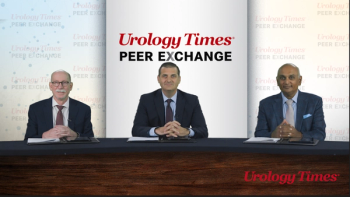Exploring Treatments for Metastatic Castration-Sensitive Prostate Cancer

Panelists discuss how the prevalence of metastatic castration-sensitive prostate cancer (mCSPC) has been increasing, potentially influenced by changes in prostate-specific antigen screening recommendations and rising diagnoses of metastatic hormone-sensitive prostate cancer.

Panelists discuss how metastatic castration-sensitive prostate cancer (mCSPC) is defined by its sensitivity to androgen deprivation therapy, while metastatic hormone-sensitive prostate cancer (mHSPC) emphasizes the cancer’s responsiveness to hormone treatment, highlighting the nuanced differences in patient management strategies.

Panelists discuss how some of the most critical challenges and unmet needs in the treatment and management of metastatic castration-sensitive prostate cancer (mCSPC) include the effectiveness of monotherapy, the need for better risk stratification, and the integration of novel therapies to improve patient outcomes.

Panelists discuss how management options for nonmetastatic castration-sensitive prostate cancer (nmCSPC) include active surveillance, radiotherapy, and systemic therapy, with recommendations influenced by factors such as tumor volume, prostate-specific antigen (PSA) doubling time, and patient life expectancy, particularly for those with high-volume symptomatic disease.

Panelists discuss how recent data from the EMBARK study indicates that in patients with nonmetastatic castration-sensitive prostate cancer (nmCSPC) at high risk for biochemical recurrence (BCR), enzalutamide combined with gonadotropin-releasing hormone (GnRH) significantly improves metastasis-free survival compared with monotherapy options, with no new safety signals reported.

Panelists discuss how guideline-recommended treatment options for metastatic castration-sensitive prostate cancer (mCSPC) include various combinations of androgen deprivation therapy, docetaxel, and novel hormonal agents, tailored to the patient’s disease characteristics and overall health.

Panelists discuss how managing cognitive and sexual health in prostate cancer patients undergoing hormonal therapy is crucial, emphasizing the need for proactive communication and tailored interventions to enhance overall quality of life.

